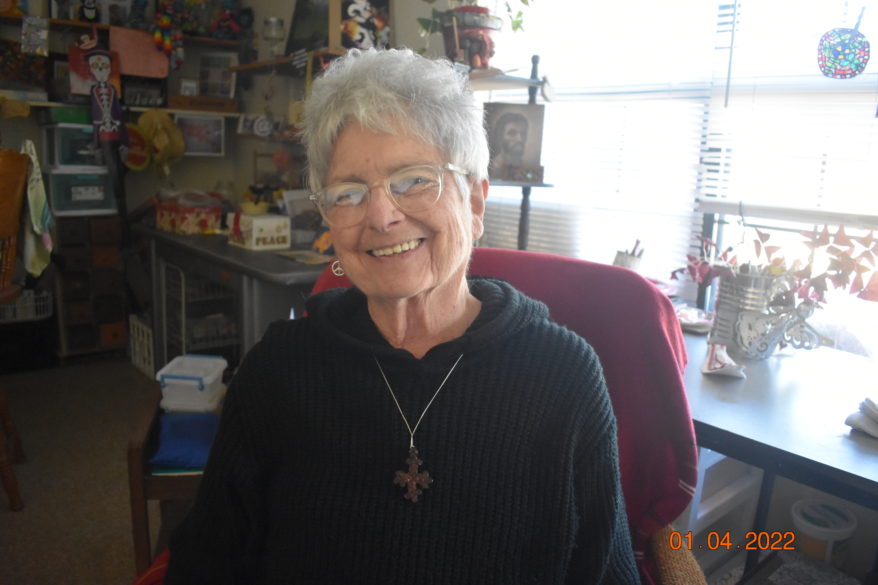FROM THE HERMITAGE
By sister alies therese
On Aug. 9, 2022, we celebrate the feast day of Edith Stein (St. Sister Benedicta of the Cross, OCD), German (born, 1891, in Breslau in what is now Poland) intellectual, scholar, typhoid-nurse hospital worker and Jewess-cum-Catholic Christian (1922) and Carmelite (1933), who at 52 was taken to the Nazi chambers and murdered (1942). I like what Sister Joan Chittister, OSB, points out:
“The fact is Edith Stein is not important because she was martyred for anything. Edith Stein is not a light to take into the 21st century because she was killed by Nazis for whatever reason. Edith Stein is a pathway through darkness because of the courage it takes to critique your own.” (emphasis mine, A Passion for Life, Orbis, 1996)

She might be best known in Carmelite circles, unlike some of her more famous Sisters, Teresa of Avila, or Therese. That she was caught up with Bonhoeffer or Kolbe and others also annihilated for religious reasons during the Nazi regime, points to the highlights (1942) of the brutal reality of authoritarian politics. Though she had been smuggled to the Netherlands, she and her sister Rosa were found out and eventually reached Auschwitz where their earthly lives ended abruptly.
In the day (and maybe today as well?), a sister professing Carmelite life took a ‘title’ pointing her in a special direction within her prayer vocation … in this case ‘of the Cross’ was chosen and the fact that she was born on Yom Kippur, the Day of Atonement, she had been on this path her whole life. She saw her life as one united with the suffering of God, the anguish of the innocent, and the prayer of the powerless. The Cross for her became the Christian marker where the greatest love had been shown, even to those who ravaged the world, who lived out of greed or insensitivity, who barreled through country after country demanding obedience and submission.
Mostly the Cross was the symbol of success, despite its narrow appearance, of the empathy theory she’d studied reminding people that to walk in another’s shoes across barriers (class, culture, ethnicity and…) is to accept a call to build together the beauty of peace. We ‘cross over,’ out of our zones into a graced place serving one another. The beauty of God, reflected in the common good, is torn asunder when the innocent are ravaged when lies become common currency for truth, and when hope seems impossible as attacking armies (of whatever kind) seek to dominate. Aren’t we just a bit too cozy with violence? Just look at Oklahoma, executing 25 men one a month (on Thursdays) for two years beginning this month. That the Cross reaches up and stretches out is a reminder that God is not just the God of ‘me’ but the God of ‘we’; when will we nourish one another and cease scrambling in darkness … perhaps they’ll come for me, for us?
In her book The Wisdom of the Cross, she remarks that through a process of death, all will come to life in Him if we are willing to give our lives.
She says, “This faith in the Crucified – united with devoted love – is for us the doorway to life and the beginning of the glory to come. The Cross is our only boast … But the cross is not the end: it is lifted high and shows us the way to heaven.” (ICS, Washington, 1996)
She had no illusion about what that meant for her, her sister Rosa and so many more; it meant death. Equally, she understood that through her tool of conversion (the autobiography of St. Teresa of Avila, 1921) she saw ‘the truth.’ Her mother was brought to tears at her conversion. ‘I’ve nothing to say against him (Jesus),’ she told Edith, ‘just that he claimed to be God.’
Before her conversion, during her years as a professor, she was very outspoken about women’s roles and wrote in the Ethos of Women’s Professions, for example: “One could say that every normal healthy woman can hold a position. And there is no profession which cannot be practiced by a woman.” (ICS) Not long after she would become unemployable because she was both woman and Jew. No place in academia for her. Does that sound familiar? How is the truth rejected? What can/not be taught? How do we ignore history?
Next month we celebrate the Feast of the Holy Cross on Sept. 14, and maybe our study of St. Benedicta might open to us deeper wisdom and help us put the suffering, especially targeted violence, at His Cross.
“As for what concerns our relations with our fellowman, the anguish in our neighbor’s soul must break all precepts. All that we do is a means to an end, but love is an end in itself because God is love.” (ICS)
(Sister alies therese is a canonically vowed hermit with days formed around prayer and writing.)
